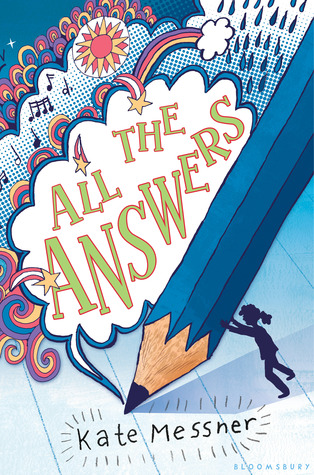 Messner, Kate. All the Answers
Messner, Kate. All the AnswersJanuary 27th 2015 by Bloomsbury USA Childrens
E ARC from Netgalley.com
Ava has been having troubles in math class, and has some test anxiety, but when she finds a pencil in these junk drawer at her house, she finds that when she writes a question, she hears an answer. This isn't the sort of thing that you share with everyone, but she tells her best friend, Sophie, who thinks that the girls could use the pencil to do any number of amusing things. There are a number of anxiety-provoking things going on in Ava's life. A large new superstore threatens to put her father's store out of business, so he spends a lot of time cooking noteworthy food like kale doughnuts, hoping to give the store a famous hook. Her grandfather is in a nursing home and being fairly uncommunicative; her grandmother passed away not long ago, and her mother and grandfather are at odds. Ava's other grandmother who lives with them hasn't been feeling well. Ava plays saxophone, but is anxious about trying out for the jazz band, and she also doesn't really want to participate in the class wilderness trip trip that includes zip lining. With the pencil's help, Ava and Sophie try to arrange romances and social situations at school, but the pencil won't tell the future. It does, however, tell Ava that a person important to her is ill, and gives her time to get the person help. She manages to solve some mysteries about the pencils, as well as problems in her own life, and finally realizes that she doesn't need to count on the pencil for help.
Strengths: Ailing grandparents seem to be a new trend in MG fiction. And it is a timely topic. Messner is a popular author, and magical realism always does well, A magical pencil that answers questions is a great premise.
Weaknesses: The preponderance of problems in this one is a bit much, and the explanations tend toward the didactic. There was so much going on that it started to seem ridiculous. The drama with Sophie, school, and the family store would have been enough. I didn't believe that Ava would not have recognized the voice of the pencil, and the explanation of why it talked was not necessary. Not my favorite Messner.
 Stanely, Diane. The Chosen Prince
Stanely, Diane. The Chosen PrinceJanuary 27th 2015 by HarperCollins
E ARC from Netgalley.com
Prince Alexos of Arctos has to deal with his stern and disapproving father, King Ecktor, but at least can run quickly. He is entered in to the kingdom's festival race, and does fairly well, considering he almost dies because he has the summer sickness. He lives, but is crippled, so his father is pretty much done with him, especially since Alexos' young brother, Teo, who is supposed to be heir now that Alexos isn't fit, dies mysteriously. Since his father has to deal with the threat of Ferra and its criminal king, Pyratos, Alexos is left to his own devices. He decides to find Peles of Attaros, who won the race, and get his out of his father's auxiliary army and make him his private guard. He manages to do that, but when his father's camp is attacked by Pyratos, and his father is killed, Alexos knows there is little that any of them can do. Traveling on Pyratos' ship, the group comes across a magical island where the only three inhabitants are Claudio, Aria... and a young boy named Teo. What is their relationship to Pyratos and Alexos, and how will Athene decide to deal with them?
Strengths: There is a huge demand for books about ancient Greece and Rome... Michael Ford's Fire of Ares trilogy is one of my best circulators. This book (which I didn't realize was based on Shakespeare's The Tempest until I pulled it up on Goodreads) had lots of details about life in ancient times, intrigue and action, and military maneuvers as well.
Weaknesses: This was written in a weirdly stilted way, using a present tense. While there was a lot of fighting going on, the focus was more on Alexos, who couldn't participate in the fighting because of his disability. This was more philosophical than I would have wanted, and reads like a book for children written in the 1950s.

























No comments:
Post a Comment